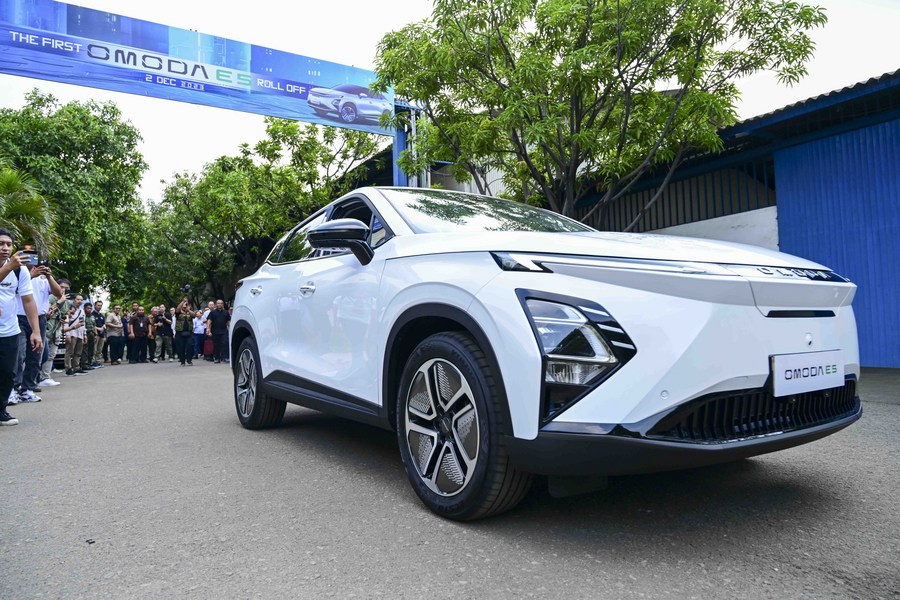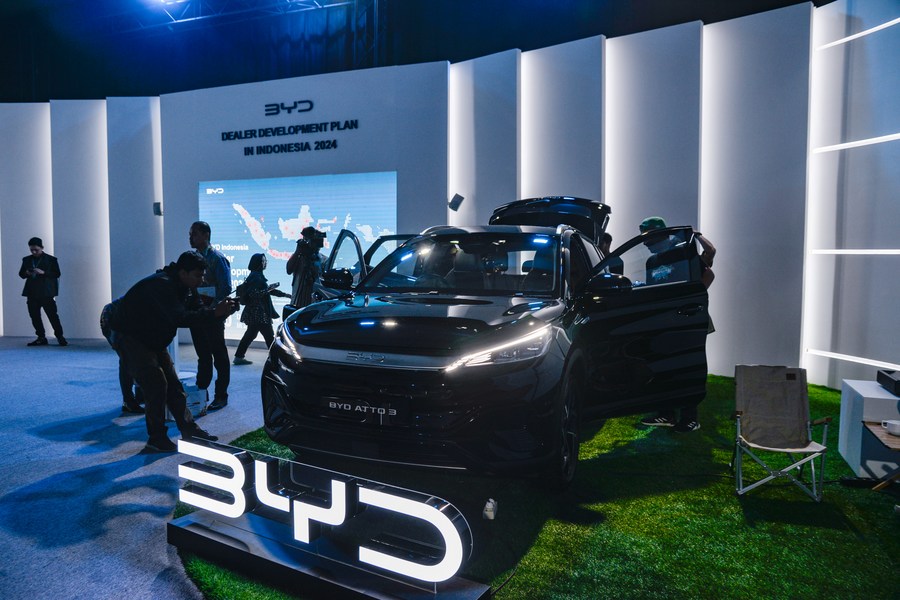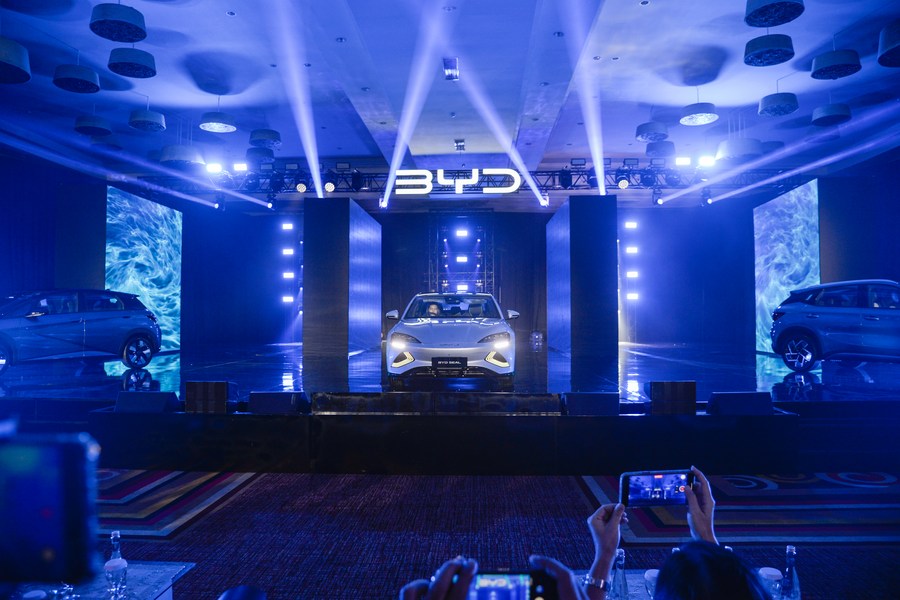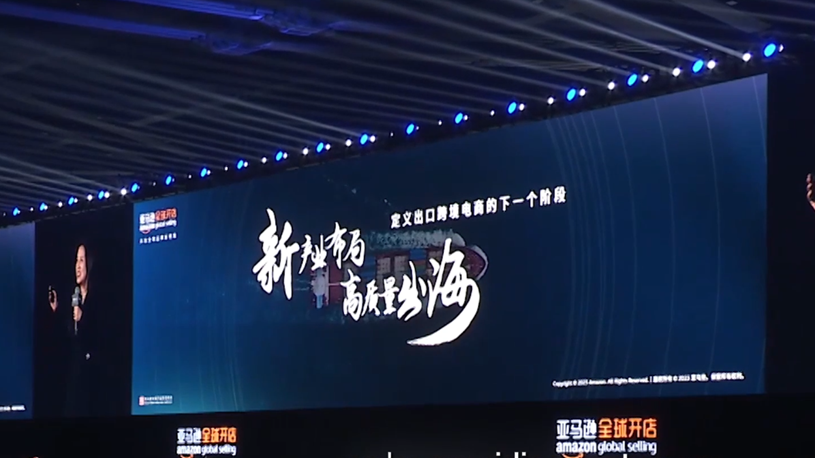
China's automotive company Chery's electric vehicle model OMODA E5 is seen during the rolling off ceremony in Bekasi, West Java, Indonesia, Dec. 2, 2023. (Xinhua/Zulkarnain)
About 66 percent of Indonesian vehicle consumers showed positive views toward Chinese cars, citing reasons including affordability, innovative features, mobility and comfort, a study by the Association of Indonesia Automotive Industries showes.
by Nurul Fitri Ramadhani
JAKARTA, Jan. 24 (Xinhua) -- China-based BYD has become the latest electric vehicle (EV) automaker that has entered the Indonesian market. Introducing three electric passenger cars, namely SEAL, Atto 3 and Dolphin, BYD is now among the list of at least five Chinese EV brands that have been sold in Southeast Asia's largest economy.
Before BYD, Chinese EV makers Wuling, DFSK, Chery and Neta have hit Indonesian EV customers. According to the Association of Indonesia Automotive Industries (GAIKINDO), the number of electric car brands from China coming to Indonesia has increased in the last six years and they have become the most popular electric car brands in the country.
The whole sales of EVs in Indonesia in 2023 reached 17,062 units, an increase of 65.2 percent compared to 2022, GAIKINDO data showed. Wuling Air EV became the second most-purchased brand, with sales of 5,575 units, after Hyundai Ioniq 5 with sales of 7,176 units.
The popularity of Chinese EVs in Indonesia came as no surprise. A study by GAIKINDO about regional automotive market revealed that 66 percent of Indonesian vehicle consumers showed positive views toward Chinese cars. The reasons included affordability, innovative features, mobility and comfort.

Journalists take photos and videos of a BYD Atto 3 outside the venue of BYD grand launch in Jakarta, Indonesia, Jan. 18, 2024. (Xinhua/Xu Qin)
Indonesian consumers were also very interested in functionality and design of Chinese EVs, in addition to their raising awareness of energy saving efficiency for vehicles.
"We really welcome Chinese EV producers to enter the Indonesian automotive market. This is a very positive signal. We are a big cake with a potential of nearly 282 million population. The rate of car ownership is 99 cars per 1,000 citizens," GAIKINDO Secretary General Kukuh Kumara told Xinhua.
As the world's fourth-largest populous nation and one of top nickel producers globally, Indonesia is believed to have considerable potential for embracing EVs. Blessed with abundant raw materials, particularly nickel as the most crucial ingredient in the production of EV batteries, Indonesia is carving to be in a prominent position in the EV industry.
Local media reported that the government had been encouraging the people to accelerate the transition to EVs as an attempt to curb air pollution, particularly in the capital city Jakarta. To push for widespread electric vehicle adoption, the authorities have also provided subsidies of up to 7 trillion rupiahs (445.6 million U.S. dollars) from the state budget for citizens to purchase EVs.
However, Indonesia does not have its own mass-produced local electric cars in its commercial market. Indonesian Minister of Industry Agus Gumiwang Kartasasmita said recently that the government offered investment opportunities for all global automotive manufacturers to build EV factories in the country and provided incentives, including import tax exemptions, for them.

New cars are shown on the stage during BYD grand launch in Jakarta, Indonesia, Jan. 18, 2024. (Xinhua/Xu Qin)
BYD, for instance, invested up to 1.3 billion dollars in the EV industry in Indonesia. Indonesia's Coordinating Minister of Maritime Affairs and Investment Luhut Binsar Pandjaitan said the presence of Chinese EVs would bring a new era for transportation electrification in Indonesia, as they offer competitive qualities compared to EVs produced by Western manufacturers, such as Tesla.
An Indonesian automotive observer and product design expert at Bandung Institute of Technology (ITB), Yannes Pasaribu, said that Chinese manufacturers had now led the electric car market in the world, particularly in Indonesia, because of two factors, advanced technology and affordable prices.
"As I observe, the country with the strongest and most advanced battery industry, at this time, is China. The country has been developing electric vehicles since 15 years ago, when other countries had nothing to do with it at that time. That is why it is not surprising that they now control the electric car market," Pasaribu said.
He said that China had the most advanced electric vehicle ecosystem in the world, and if compared to other leading EV producing countries, such as the United States and South Korea, China is able to develop a very efficient manufacturing system. "And that is one of primary reasons why the vehicles they produce can offer very competitive prices," he said. ■












